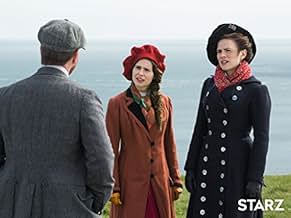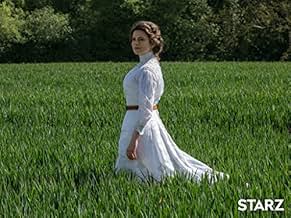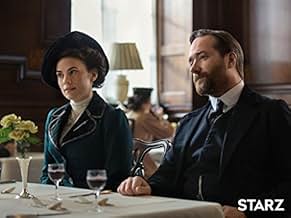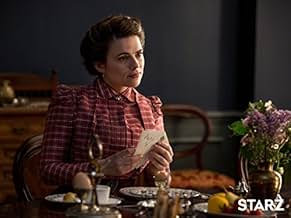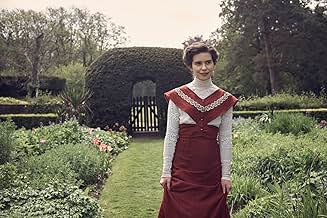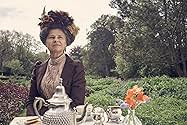La interacción de tres familias, de diferentes clases sociales, a principios del siglo XX: los adinerados Wilcoxes, los gentiles e idealistas Schlegels y los Basts, de clase media baja.La interacción de tres familias, de diferentes clases sociales, a principios del siglo XX: los adinerados Wilcoxes, los gentiles e idealistas Schlegels y los Basts, de clase media baja.La interacción de tres familias, de diferentes clases sociales, a principios del siglo XX: los adinerados Wilcoxes, los gentiles e idealistas Schlegels y los Basts, de clase media baja.
- Nominada a1 premio BAFTA
- 1 premio ganado y 12 nominaciones en total
Explorar episodios
Opiniones destacadas
Matthew McFayden and Hayley Atwell just lit up the screen... I thought perhaps the glory days of BBC Sunday night costume dramas had past, but their performances here were wonderful, the control and command of the dialogue was exquisite. A delight.
I have given 9 out of 10, so I will note that a few minor quibbles: - Some of the plot elements were a bit clunky - It wasn't always clear how much time had elapsed or how much the characters had aged - It felt a little stretched out to episodes
I have given 9 out of 10, so I will note that a few minor quibbles: - Some of the plot elements were a bit clunky - It wasn't always clear how much time had elapsed or how much the characters had aged - It felt a little stretched out to episodes
Although I felt the 1992 film was so good that it couldn't be improved on, I found this TV version surprisingly good and the four hours hardly seemed enough to contain all the strands of the story. The acting was perfect, neither overdone nor underdone. As it happens, I live in Stevenage and know the location of Howards End well. The location used was somewhere else of course but I thought it was quite like the original could have been in 1890 when the author would have known it, and perfect for the purposes of the drama. I sympathise with the points people make about black servants and so on, but whether or not these exist in the book, they are certainly quite plausible for the time. The winner for me was E.M. Forster again, as it was in 1992, but I will miss the programme and wish there could be a sequel - perhaps another Passage to India. It's indeed a pity that Forster stopped writing novels so soon, as with his understanding of social mores and change, he would have been a good person to write about the 1930s or 1940s. The last hour was for me a blissful one.
... I much preferred the 1992 Emma Thompson/Anthony Hopkins/James Ivory movie version. Perhaps I'm too much a fan of Merchant Ivory films. It's a pleasure watching Matthew Macfadyen in anything. And I look forward to future roles for Hayley Atwell. It's not that this mini-series version is inferior. It simply didn't arouse as much of my sympathy for any of the characters as the 1992 version.
I fell in love with Emma Thompson's portrayal of Margaret Schlegel in the 1990s film version. I loved the film as a whole. But this version is just as worthy, and being a four-hour series, can embrace a larger picture and more importantly, a larger canvas of characters.
Leonard Bast is central to the plot, but in the film, he was a cipher, a vessel and a canvass for the sisters to paint. I read the book and while women of their class might have seen him that way, I didn't, and I liked that he was given more of a presence and personality. In the film there was no real connection between him and Helen, while in this version, there is one, however tenuous and fleeting. I felt it gave him the respect he deserved, and in doing so strengthened the underlying message.
I also preferred this version of Henry. Hopkins is brilliant, but to me, Margaret's attraction to him in the film made little sense. No, not even in Edwardian times. She was fierce and self-possessed, he was dull and rigid, and she didn't need his money or stamp of approval. I needed to buy the connection and this version made it breath so much more freely. Not even Emma Thompson can convince me of something unpalatable.
Some stories just need more time to unfold. Four hours worked well enough, whereas two and half, or even three, didn't. I still love the film version and Helena Bonham Carter is just irreplaceable, but Philippa Coulthard makes a great Helen too People who want to have an issue with Jackie Bast or a few servants or doctors being minorities can fuss away about it all they want. It might be historically unlikely, but it is by no means historically "incorrect" and it shouldn't jar anyone who is paying attention to what matters in the story. If anything it adds to it.
I loved this version. Kudos to all involved, especially Atwell, Coulthard, McFadyen, and the young actor playing Tibby. Oh, and Ullman. It can be scary to take on a classic that has supposedly been "claimed" by film deities. They did it proud.
Leonard Bast is central to the plot, but in the film, he was a cipher, a vessel and a canvass for the sisters to paint. I read the book and while women of their class might have seen him that way, I didn't, and I liked that he was given more of a presence and personality. In the film there was no real connection between him and Helen, while in this version, there is one, however tenuous and fleeting. I felt it gave him the respect he deserved, and in doing so strengthened the underlying message.
I also preferred this version of Henry. Hopkins is brilliant, but to me, Margaret's attraction to him in the film made little sense. No, not even in Edwardian times. She was fierce and self-possessed, he was dull and rigid, and she didn't need his money or stamp of approval. I needed to buy the connection and this version made it breath so much more freely. Not even Emma Thompson can convince me of something unpalatable.
Some stories just need more time to unfold. Four hours worked well enough, whereas two and half, or even three, didn't. I still love the film version and Helena Bonham Carter is just irreplaceable, but Philippa Coulthard makes a great Helen too People who want to have an issue with Jackie Bast or a few servants or doctors being minorities can fuss away about it all they want. It might be historically unlikely, but it is by no means historically "incorrect" and it shouldn't jar anyone who is paying attention to what matters in the story. If anything it adds to it.
I loved this version. Kudos to all involved, especially Atwell, Coulthard, McFadyen, and the young actor playing Tibby. Oh, and Ullman. It can be scary to take on a classic that has supposedly been "claimed" by film deities. They did it proud.
...is that they don't put their money where their mouth is and have a lead character played by a racial minority person. Inserting people of color in some of their recent productions is just too obviously done because they have to stick a minority in there somewhere or they will feel the trendy white guilt. It is an insult to anyone with a logical and realistic brain cell in their head why they do this. And although I am sure the minority actors are very happy to have the roles and the money and the exposure, you would think they would feel somewhat put out because they are being used to be tokens of political correctness not because of their talents.
¿Sabías que…?
- TriviaHayley Atwell and Matthew McFadyen worked to together in "The Pillars of the Earth" in 2010.
- ConexionesReferenced in Honest Trailers: The Oscars (2017) (2017)
Selecciones populares
Inicia sesión para calificar y agrega a la lista de videos para obtener recomendaciones personalizadas
Detalles
- Fecha de lanzamiento
- Países de origen
- Sitio oficial
- Idiomas
- También se conoce como
- 霍華德莊園
- Locaciones de filmación
- Myddleton Square, Clerkenwell, Londres, Inglaterra, Reino Unido(Schlegels' house)
- Productoras
- Ver más créditos de la compañía en IMDbPro
Contribuir a esta página
Sugiere una edición o agrega el contenido que falta








